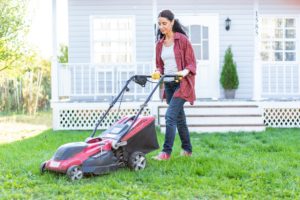
What are the benefits of leaving grass clippings behind vs. bagging clippings? Find out which is best for your lawn.
Mowing your lawn properly is one of the best ways to care for your lawn and maintain its health. When you mow your lawn, you create grass clippings – but what should you do with them? Many people choose to bag their clippings and throw them away. However, you can leave your grass clippings on your lawn to provide your turf extra nutrients and other natural health benefits. What are the advantages of leaving grass clippings behind? Discover how clippings can help, as well as the best situations in which to leave or bag grass clippings.
Nutrients Remain in Grass Clippings
About one-quarter of the nutrients your lawn needs are in grass clippings left behind from mowing. These nutrients include potassium, nitrogen, phosphorus and micro-nutrients. As the clippings break down, the nutrients seep into the soil and are available for the turf’s roots to take them up. The nutrients also feed microorganisms in the soil that eat lawn thatch. Water and oxygen can penetrate the soil more easily when thatch is minimized.
Remove Any Thatch Before Mowing for Best Results
Lawn thatch can quickly lead to problems if a layer develops that is more than ½-inch thick. The thick layer inhibits moisture and nutrients from reaching your lawn’s roots and provides an environment that may house diseases and pests.
Before you mow your lawn, remove excess thatch with a vertical mower, garden rake, or core aerator so when you leave grass clippings behind, the clippings will be in contact with the soil and decompose naturally.
Summer Mowing
Your mower should cut off no more than one-third of the grass blades at any one mowing. Removing more than one-third of the turf’s leaves puts undue stress on your lawn. The root system can gather lots of moisture and nutrients from grass clippings as they decompose. As summer temperatures rise grass will grow more slowly and your mowing frequency will decrease. During those hot summer days, leaving grass clippings behind creates a kind of mulch that helps maintain moisture in the soil.
Can You Have Excess Grass Clippings?
If you adhere to the one-third rule it is very unlikely that clippings will be excessive. One-half-inch clippings will fall between the grass blades and contact the soil. Your lawn might produce more grass clippings than you need during the growing season. Also, try to mow your lawn when the grass blades are dry so the clippings don’t clump together. If you need to mow off more than one-third of the grass and create excessive clippings, you can rake away the excess clippings, dispose of them, use them in a compost pile, or use them as a mulch layer in your vegetable garden.
Utilize a Mower With Mulching Blades
Many mower manufacturers now offer mulching mowers. Generally these mowers combine aerodynamically designed blades and mower housings that keep the clippings inside the mower housing until they are finely chopped. Finely chopped clippings fall through the lawn to the soil level where they naturally decompose quickly and provide nutrients to your growing lawn.
Leaving grass clippings behind can be an excellent way to add nutrition to your lawn.
Scientific Plant Service Is Your Go-To Source In Landscape Healthcare
Scientific Plant Service, located in Baltimore, is a privately owned corporation, chartered in Maryland in 1957 by Frank J. Burke. We started as a full-service Arborists specializing in the care of shade trees and ornamental shrubs, but today we are a Lawn Care company that is a huge part of the community. From aquatic environments and snow management to deer and mole control, SPS has services tailored specifically for your lawn and landscape.
We offer services in Maryland, Washington, DC, and Virginia, including: Harford, Baltimore, Carroll, Frederick, Howard, Anne Arundel, Montgomery, Prince Georges, Talbot, Queen Anne’s, Calvert counties in MD, as well as Loudoun County, Fairfax County, Arlington, Alexandria, and Falls Church in VA. For more information, contact us online, or call us at 410-321-0970. Be sure to follow us on Facebook, Twitter, LinkedIn, and Pinterest.

